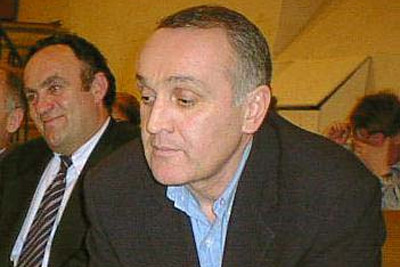
COMPETING THEORIES ABOUT ATTEMPTED ASSASSINATION IN ABKHAZIA
Publication: Eurasia Daily Monitor Volume: 2 Issue: 43
By:

Alexander Ankvab, prime minister of the self-proclaimed Republic of Abkhazia in Georgia, narrowly escaped death late on February 28 when still-unidentified assailants shot at his motorcade. Ankvab and his entourage were heading from the capital, Sukhumi, north toward Gudauta. The gunmen were waiting to ambush Ankvab’s motorcade in the village of Achadara, near the bridge over the Gumista River.
Ankvab survived thanks to pure luck. He was riding in the car of deputy prime minister Leonid Lakerbaya, which was following Ankvab’s regular vehicle. Undoubtedly, Ankvab was the intended target. The gunmen peppered Ankvab’s car with automatic rifles, according to investigators, who counted as many as 17 bullet holes in the vehicle. However, no one inside the car, including the driver, was even wounded. The Abkhaz Interior Ministry has launched an investigation but has released no information about possible suspects.
Sergei Bagapsh, president of Abkhazia, called for calm and stated on March 1, “The situation in the republic is stable and Abkhaz authorities fully control it.” He ruled out any political motivations behind the assault and put responsibility on “criminal elements.”
That same day the Russian Foreign Ministry released an official statement that linked the assault on Ankvab to attempts to destabilize “the normalizing situation” in Abkhazia and complicate the prospects of settling the Georgian-Abkhaz conflict. Tbilisi may regard the statement as Moscow’s attempt to irritate Tbilisi. Giorgi Khaindrava, Georgian State Minister for Conflict Resolution, condemned the attempt on Ankvab’s life. “Any destabilization in Abkhazia, including murderous assault, runs counter to our interests,” he stressed. He derided the Russian statement and said, “After Ankvab made a statement about personnel changes in the government, certain forces turned against him.”
Ankvab was a close ally of Bagapsh during the disputed elections in Abkhazia last fall, and he was also the informal leader of the influential Abkhaz civic movement “Aitaira” (Revival). Ankvab acceded to the office of prime minister on February 14 and immediately began to purge the executive of holdovers. Some Russian analysts argue that the attempts to remove many influential persons from their sinecures might have been the motive behind the assassination attempt.
Ankvab himself denied any “Georgian connection” in the attempt on his life and said that it was actually the work of criminal groups angered by his moves to eliminate opportunities for illegal profits and to introduce wide-scale anti-corruption measures. Ankvab said that he had accumulated many enemies since he served as interior minister in 1992-93.
Despite the Abkhaz authorities’ attempt to blame the assault on unnamed criminal groups, analysts tend to view this incident within the broader context of the ongoing power struggle between Bagapsh and his rival during the presidential election, Raul Khajimba. The dispute between them was temporarily resolved by the Russia-mediated power-sharing agreement in December 2004, according to which Bagapsh accepted a presidency with reduced powers and Khajimba became vice-president with the mandate to supervise the power ministries, foreign policy, and the distribution of 40% of the presidential budget.
The pundits’ forecast that a fragile and largely artificial truce would not last long came true on February 24, when, sources in Sukhumi claim, Bagapsh and Khajimba came to blows over cabinet appointments made by Bagapsh on February 24-25. Khajimba claimed that Bagapsh ignored his suggestions for the posts of minister of foreign affairs, minister of interior, and customs chief and thereby broke the power-sharing agreement. Bagapsh denied the charges.
At the same time, it is evident that Bagapsh and Ankvab are doing their best to purge the Abkhaz government of the representatives of the clan of former president Vladislav Ardzinba, who is Khajimba’s patron. In an interview with Segodnya.ru, Ankvab stated that he would reconsider the questionable results of several privatization deals. In an interview with the Georgian news agency Inter Press, Ankvab said that his assailants might be the owners of an illegal metal scrap and timber exporting business that he had restricted. “However, the government is not going to backtrack,” he added.
Avtandil Ioseliani, chief of Georgian foreign intelligence and KGB chief in Abkhazia before the war, argues that Russian special services were behind the attempt on Ankvab’s life, because they dislike Ankvab’s relatively independent political attitude. Furthermore, “70% of officers in the Russian peacekeeping troops in the Georgian-Abkhaz conflict zone are Russian intelligence staff,” he claimed. Paata Zakareishvili, one of the champions of Georgian-Abkhaz public diplomacy, shares this version and says that Ankvab has not made any significant step against criminals to provoke their retaliation. He says that Russia dislikes Ankvab because he puts Abkhaz national interests above Russian concerns. Meanwhile, Paata Davitaia, previously a member of the exiled Abkhaz government, argues that assassination attempt on Ankvab was actually by his own Abkhaz government in order to complicate the regional situation before the forthcoming Georgian-Abkhaz peace talks in Geneva. He noted that Russian special services typically do not miss their target.
Whatever the real explanation behind the attempt on Ankvab’s life, one thing is quite evident. For the immediate future, Abkhaz political life will continue to be marked by clan rivalry, competing views of Abkhazia’s future, and Russian involvement.
(Segodnya.ru, Gazeta.ru, mid.ru, Regnum, February 28; Mze TV, Civil Georgia, Rustavi-2 TV, Inter-Press, March 1; Apsnypress, Resonance, February 25, March 1, March 2)




